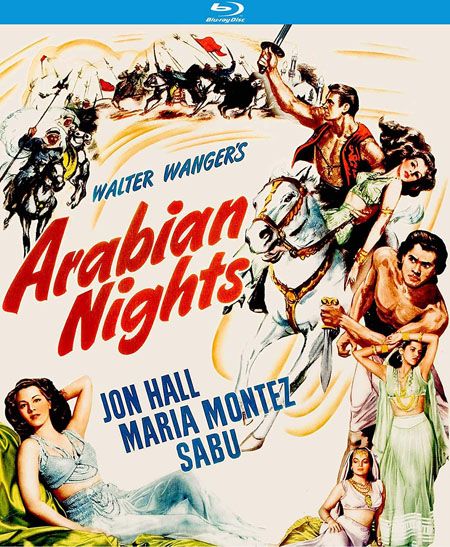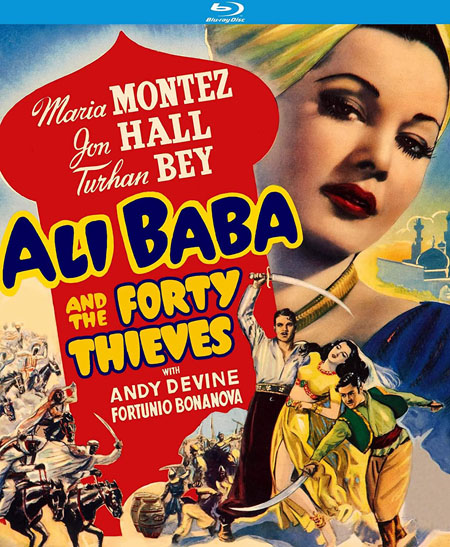
“TECHNICOLOR
SABERSâ€
By
Raymond Benson
Was
this really a movie sub-genre? Colorful “Middle Easternâ€
action-comedy-adventures loosely derived from The Book of One Thousand and
One Nights? Full of harem girls, saber-wielding swashbucklers, epic set
pieces with beautifully designed sets and “Arabian†costumes, camels and horses
and tigers, and… comedians?
The
answer is, ahem, yes. During the war years of the early 1940s, Universal
Pictures made several of these “exotic adventure†pictures that capitalized on
the success of Britain’s Thief of Bagdad (1940). Hollywood quickly got
into this act, but like the Bing Crosby and Bob Hope “Road to…†pictures, these
movies set in the world of ancient Arabia were filmed on sound stages in
southern California… and it shows.
The
films were hugely popular at the time, but they have not aged well. We shall
examine two of the more successful entries of this short-lived movement—Arabian
Nights from 1942, and Ali Baba and the Forty Thieves from 1944. Each
picture shared some actors and a cinematographer (W. Howard Greene). Nights was
nominated for no less than four Academy Awards in the categories of
Cinematography and Art Direction (both richly deserved), Sound Recording, and
Score (by Frank Skinner). Ali Baba did not chart at awards season, but
it is, in truth, the better picture.
The
good: These are gloriously produced old Technicolor extravaganzas that show off
the artistry and imagination that only Hollywood can concoct. The films are
truly gorgeous, and the new high definition restorations bring out the colors with
intensity (of the two, Arabian Nights looks the best, but both are
visually exquisite). Secondly, the films provide some excellently choreographed
action sequences such as battles between Arabs and Mongols. It’s as if the
pirate film genre had migrated to the Islamic Golden Age.
But
therein lies the bad. These films have almost nothing to do with the real Book
of One Thousand and One Nights. They are full of stereotypes and likely
blasphemous depictions of Islam. Arabic characters are played by white
Hollywood actors with darkened skin makeup. If all that weren’t bad enough, way
too much of each movie is played for laughs. Blatantly comic actors are cast in
major roles and they stand out like broccoli in a fruit basket. Consider this: Shemp
Howard plays “Sinbad†in Arabian Nights, and he acts exactly like…
Shemp Howard, complete with New York accent, mugging facial expressions, and squeaky
vocalizations when he’s frightened. Loud, sneezy Billy Gilbert also has a
sizable role in the picture. Ali Baba is graced with the presence of
none other than… Andy Devine in a supporting role as one of the Forty
Thieves. Andy Devine as an Arab? He even speaks like Andy Devine in his
whiny drawl, “Aw, Ali, you don’t want to marry the princess! A thousand gold coins
can get you a girl in the marketplace who’s just as purdy!â€
Jon
Hall stars in both movies as our hero. In Arabian Nights, he’s
Haroun-Al-Raschid, the brother of the caliph. He has the title role in Ali
Baba. Sultry Maria Montez is also in both pictures as the love interest. In
the first, she is the famous dancer, Scheherazade (although in the credits and
promotional materials, this is spelled Sherazade, but the characters pronounce
her name the proper way). In Ali Baba, she is Amara, the prince’s daughter.
Turkish-Czech actor Turhan Bey also appears in both movies in supporting roles.
The popular Indian actor Sabu is a featured performer in Arabian Nights,
having emigrated to Hollywood after the success of Thief of Bagdad.
Arabian
Nights is
the tale of two rival brothers, Haroun and Kamar (Leif Erickson, credited as
Leif Erikson), their pursuit of Scheherazade, and their quest to gain power in
Arabia.

Ali
Baba and the Forty Thieves is the tale of Ali, the true caliph who is in exile
because Bagdad is overrun by the Mongols. He wants to reunite with his
childhood sweetheart, Amara, run the Mongols out of town, and reclaim the city
for the Arabs.
The
eye-rolling aspects aside, one must consider the films within the context of
when they were made and released. Yes, they’re silly and loads of rubbish, but in
their own way they are fun and entertaining. If one can get past Shemp Howard
and Andy Devine, one might have a few laughs and appreciate the scenic beauty
on display in these admittedly superb presentations.
Both
films come with interesting audio commentaries by film historian Phillipa
Berry. The theatrical trailers for each title and others from Kino Lorber are
on both disks as well.
Arabian
Nights and
Ali Baba and the Forty Thieves, available separately from Kino Lorber,
are prime examples of the Exotic Technicolor Adventure movement that Hollywood
once pushed. So, grab your magic lamp, rub it a few times, sit back, and watch
these vibrant burlesques with your favorite genie.
CLICK HERE TO ORDER "ARABIAN NIGHTS" FROM AMAZON
CLICK HERE TO ORDER "ALI BABA AND THE FORTY THIEVES" FROM AMAZON